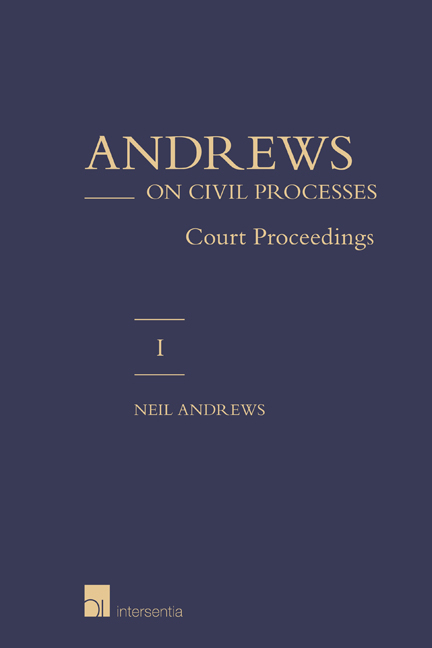Book contents
- Frontmatter
- Dedication
- Epigraph
- Preface
- Contents
- Table of Cases
- Table of Statutes
- Table of Statutory Instruments
- PART I INTRODUCTION TO THE FORMS OF CIVIL JUSTICE
- PART II COMMENCEMENT OF COURT PROCEEDINGS AND PREPARATION FOR TRIAL
- PART III END-GAME: TRIAL, APPEAL, FINALITY AND ENFORCEMENT
- PART IV COSTS AND FINANCING OF LITIGATION
- PART V SPECIAL PROCEEDINGS
- PART VI PRINCIPLES OF CIVIL LITIGATION
- Chapter 25 The Five Constellations of Procedural Principle
- Chapter 26 Judicial Independence and Impartiality
- Chapter 27 Due Notice
- Chapter 28 Publicity and Open Justice
- Chapter 29 The Duty to Give Reasoned Decisions
- PART VII THE EUROPEAN CONTEXT
- Select Bibliography
- Index to Volumes I and II
Chapter 26 - Judicial Independence and Impartiality
from PART VI - PRINCIPLES OF CIVIL LITIGATION
Published online by Cambridge University Press: 13 December 2017
- Frontmatter
- Dedication
- Epigraph
- Preface
- Contents
- Table of Cases
- Table of Statutes
- Table of Statutory Instruments
- PART I INTRODUCTION TO THE FORMS OF CIVIL JUSTICE
- PART II COMMENCEMENT OF COURT PROCEEDINGS AND PREPARATION FOR TRIAL
- PART III END-GAME: TRIAL, APPEAL, FINALITY AND ENFORCEMENT
- PART IV COSTS AND FINANCING OF LITIGATION
- PART V SPECIAL PROCEEDINGS
- PART VI PRINCIPLES OF CIVIL LITIGATION
- Chapter 25 The Five Constellations of Procedural Principle
- Chapter 26 Judicial Independence and Impartiality
- Chapter 27 Due Notice
- Chapter 28 Publicity and Open Justice
- Chapter 29 The Duty to Give Reasoned Decisions
- PART VII THE EUROPEAN CONTEXT
- Select Bibliography
- Index to Volumes I and II
Summary
JUDICIAL INDEPENDENCE
INTRODUCTION
The Constitutional Reform Act 2005 seeks to enshrine respect for judicial independence in the United Kingdom, including the ‘tribunal judiciary’. Article 6(1) of the European Convention on Human Rights also requires courts and other tribunals to be ‘independent’.
On this Lord Hope commented in Porter v. Magill (2001) that ‘there is a close relationship between the concept of independence and that of impartiality’ (on the latter, 26.19 ff), and he quoted from the European Court of Human Rights in Findlay v. UK (1997):
‘The Court recalls that in order to establish whether a tribunal can be considered as “independent”, regard must be had inter alia to the manner of appointment of its members and their term of office, the existence of guarantees against outside pressures and the question whether the body presents an appearance of independence. As to the question of ‘impartiality’, there are two aspects to this requirement. First, the tribunal must be subjectively free from personal prejudice or bias. Secondly, it must also be impartial from an objective viewpoint, that is, it must offer sufficient guarantees to exclude any legitimate doubt in this respect. The concepts of independence and objective impartiality are closely linked…’
Lord Hope added in Porter v. Magill (2001):
‘In both cases the concept requires not only that the tribunal must be truly independent and free from actual bias, proof of which is likely to be very difficult, but also that it must not appear in the objective sense to lack these essential qualities.’
And Lord Bingham wrote, in The Business of Judging (2000):
‘[I]mpartiality and independence may not be synonyms, but there is a very close bloodtie between them: for a judge who is truly impartial, deciding each case on the merits as they appear to him or her, is of necessity independent.’ (On this ‘blood-tie’ in the context of arbitration, see 4.16 ff, vol II).
The (non-binding) American Law Institute/UNIDROIT Principles recommend: ‘The court and the judges should have judicial independence to decide the dispute according to the facts and the law, including freedom from improper internal and external influence.’ And: ‘Judges should have reasonable tenure in office.’
- Type
- Chapter
- Information
- Andrews on Civil ProcessesCourt Proceedings, pp. 733 - 752Publisher: IntersentiaPrint publication year: 2013



